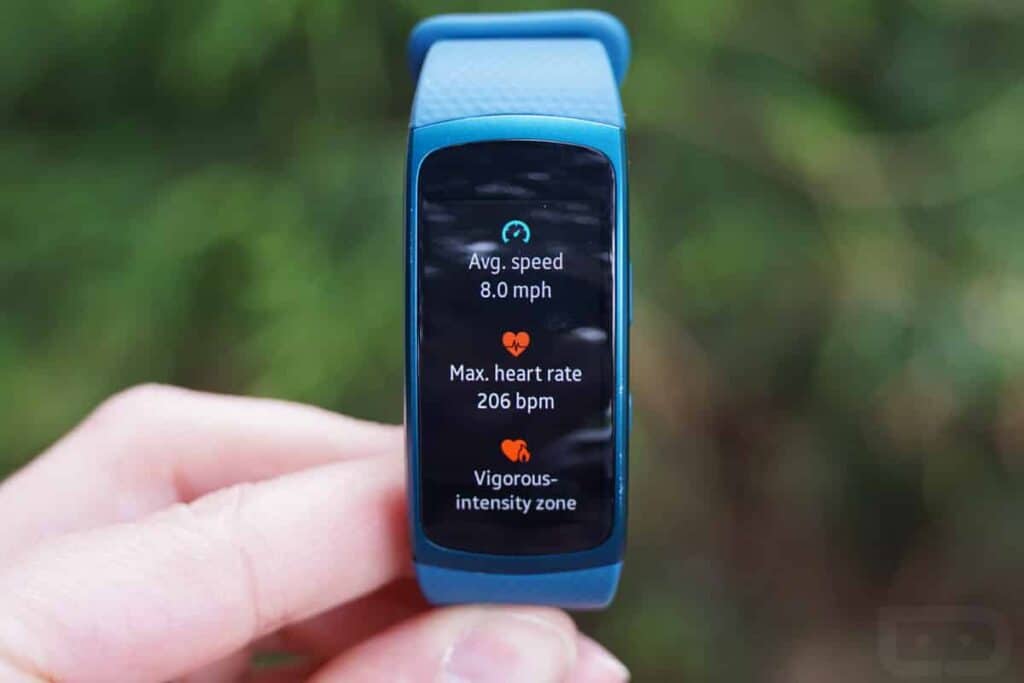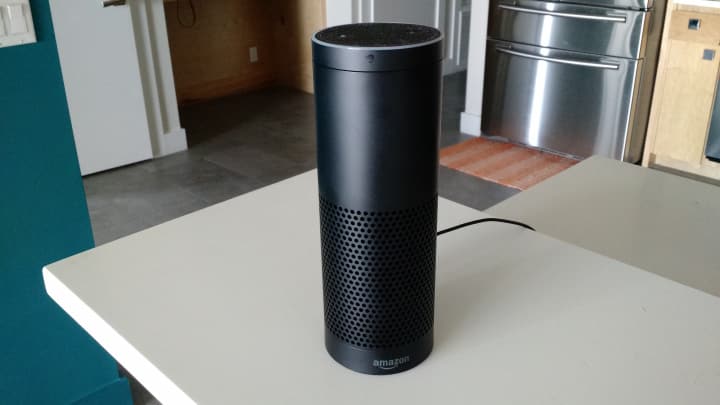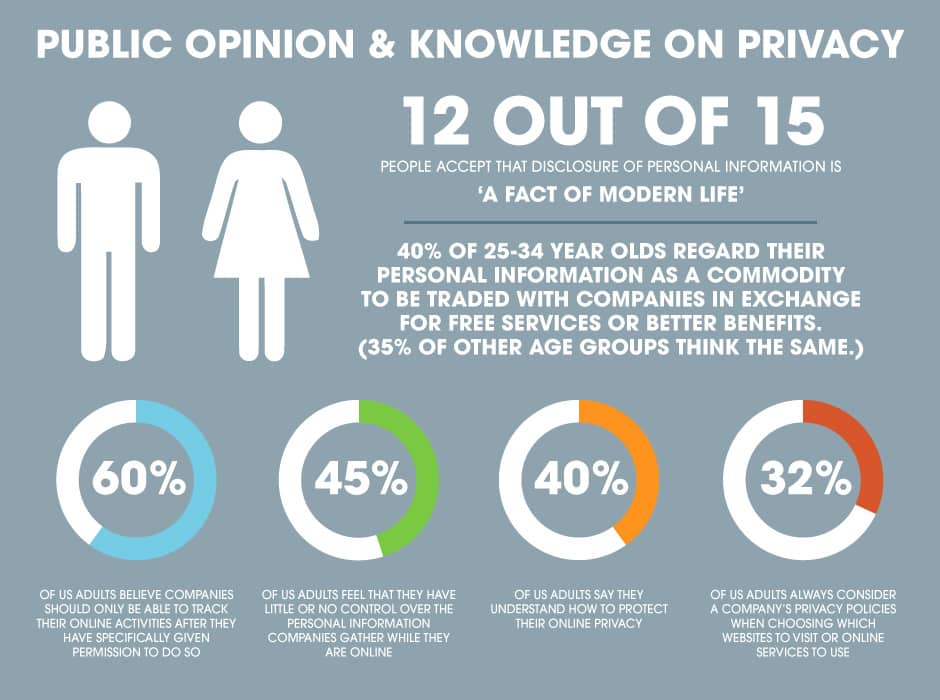Are wearables are changing our concerns about sharing location and personal data? I’ve been wrestling with the wearables and privacy issues since the wearable technology market is now dominated by fitness trackers. The devices need location services turned on. And they usually hold a great deal more personal data. You can’t use it if doesn’t know who you are – or where you are.

The bargain we strike is similar to the rise of social media. We so love the features that we give only passing thought to what we exchange in return. Depending on your predilections, Faust may come to mind.
I always ask my students how many have read the Terms of Service agreements for the social platforms they use. My surveys are only anecdotal evidence, but the answer is about one out of a hundred. More will stop using a platform once they’ve shared too much data and pulled back due to privacy concerns.
They live in a different world – public by default, private by choice. The older generation went with the opposite model.
But as a recent article on wearables and privacy in StreetFight noted, fitness trackers and Smartwatches will push the sharing of personal data further.
More than 20% of Americans now use wearable devices, with more than 780 million of these devices expected to be on the market by the end of 2018. Fitbits and Apple Watches are becoming ubiquitous for health-conscious millennials. In order to take advantage of all the features that wearable fitness trackers offer, consumers have had to open up their privacy restrictions and enable a higher level of real-time location sharing than they were comfortable with in previous years.
Let that number sink in for a minute – 780 million. That sounds like the beginning of the Smartphone revolution. While hacking incidents are increasingly in the news (and in our elections), we’re rapidly adopting tech devices that put our data in someone else’s hands.
At home, Google Home listens attentively to everything I say, waiting for the magic “Ok Google” phrase. Step out the door, and my Apple Watch is tracking my every step.
Add in my transit data and the estimated 200 security cameras that capture our daily activities and the better question might be – what privacy?
Wearables and Privacy
There’s a spate of recent articles on wearables and privacy, no doubt spurred by the number of fitness trackers unwrapped over the holidays. But no one really has a measure of the Brave New World we’re entering.
There was a report by the U.S. Department of Health and Human Services back in June exploring the data collection issues for nonprofits and corporations not regulated by HIPAA. You knew there would be an acronym here – NCE’s for non-covered entities. But the report doesn’t go much beyond a discussion of what is and is not covered by HIPAA. In fact, the main conclusion of the report only states the obvious:
While technological innovation has advanced at an extraordinary pace in recent years, privacy and security protections of health information have not kept up.
Did I need a 34 page report with footnotes to tell me that?

And if you look elsewhere in the popular press, the conclusion seems to be that consumers should make sure their data is held by companies they trust.
Of course, everyone trusted Yahoo! until they didn’t.
As an apt article title in BetaNews put it, “Consumers don’t trust companies with their data, but they’re willing to share personal info.”
Alexa, will you testify against the defendant?

While Amazon’s Echo is not wearable technology (not yet, at least), it takes the issue even further. Here’s the beginning of an Internet of Things world (maybe we should say whirlpool). A recent court case has a prosecutor wanting to use Alexa as evidence:
Be careful your home digital assistant doesn’t rat on you. In Arkansas, police obtained a search warrant for an Amazon Echo belonging to James Bates in the hopes the device would cough up voice evidence to suggest Bates had strangled his friend in a hot tub.
One doubts Bates actually asked Alexa how to strangle someone. But like any good IoT device, it’s always listening. Predictably, Amazon has refused, but given the role of Smartphones in court cases, that may not be a tenable stance for long.
However, as Fortune noted in this incident, evidence for the case may turn out to be a device that has been tracking a segment of our lives for the past couple of decades – our water meters.
Privacy may be far more of an illusion than we realize.
The future of privacy

Privacy is an odd concept. It’s concrete yet illusory, static but constantly evolving, personal yet deeply intertwined with our cultural assumptions.
If I had to risk a definition, I’d probably invert Justice Stewart’s deservedly famous comment on pornography in the Jacobellis v. Ohio case in 1964 – “But I know it when I see it. . .” So the threshold for privacy may well be the following: But I know it when I’ve lost it.
In much of our digital lives, privacy is nothing more than a commodity to be traded for free services, whether we are conscious of that exchange or not. It only becomes an issue when the “exchange rate” sours and turns against us.
As wearables flood the market, they are changing our perception of personal data and how we share it. Millions of Fitness Trackers turned up under Christmas trees this year. Whether we realize it or not, they’re setting the stage for how we will live in an Internet of Things world.
Emory Craig is a writer, speaker, and consultant specializing in virtual reality (VR) and artificial intelligence (AI) with a rich background in art, new media, and higher education. A sought-after speaker at international conferences, he shares his unique insights on innovation and collaborates with universities, nonprofits, businesses, and international organizations to develop transformative initiatives in XR, AI, and digital ethics. Passionate about harnessing the potential of cutting-edge technologies, he explores the ethical ramifications of blending the real with the virtual, sparking meaningful conversations about the future of human experience in an increasingly interconnected world.

